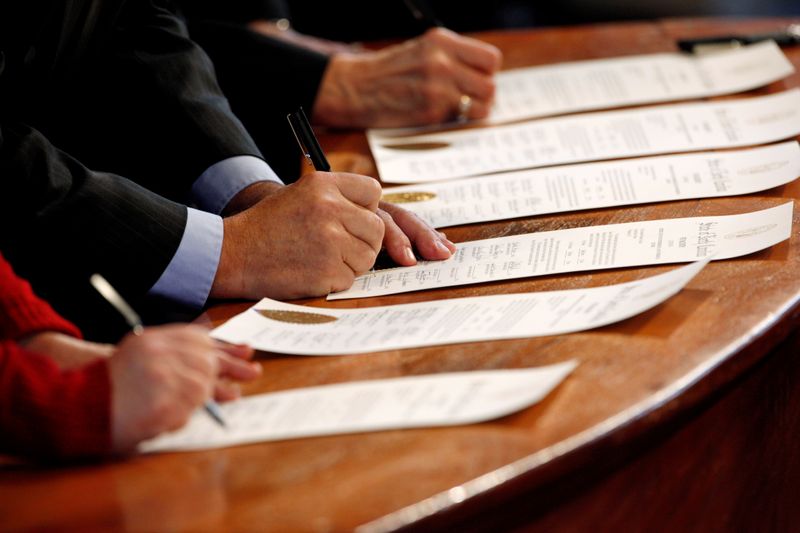By Tom Hals
(Reuters) - U.S. presidents are chosen by electors, party loyalists who pledge to vote for their candidate once their state's voters have made their selection clear. The polarized climate in the United States has heightened the risk that "faithless" electors may break that promise to voters, however, increasing the possibility of confusion around this year's result.
Below is an explanation of "faithless" electors and how they could disrupt the outcome of the Nov. 3 presidential election.
What role might "faithless" or rogue electors play?
Under the U.S. Constitution, 538 electors – known as the Electoral College – determine the winner of the presidential election.
In all but two of the 50 U.S. states, the popular vote determines which candidate will receive all of that state's electors, who are apportioned by the number of representatives in Congress.
On rare occasions, "faithless electors" have cast their vote for someone other than the candidate that won the popular vote in their state, however.
If the race is tight, a few rogue electors could break from their pledged candidate and throw the outcome of the election into doubt.
When have electors been faithless before?
Out of 23,507 elector votes cast in 58 presidential elections, just 90 have gone rogue, according to FairVote, which advocates for electoral changes.
Sixty-three electors changed their votes in 1872 after the losing candidate on Election Day, Horace Greeley, died before the Electoral College met.
In 2016, 10 electors from six states went rogue, eight defecting from former Democratic candidate Hillary Clinton and two from Republican Donald Trump. These faithless electors cast their vote for Democratic Senator Bernie Sanders, activist Faith Spotted Eagle and three Republicans - John Kasich, Colin Powell and Ron Paul. Their actions had no effect on the outcome: Trump ended up with 304 electoral votes versus 227 for Clinton.
Only once, in 1796, has an elector cast their vote for the opponent of their pledged candidate.
Is it legal?
Most states have laws that bind electors to their pledged candidate and 15 impose a penalty for faithless votes, including cancelling the vote and fines of up to $1,000. In New Mexico, a faithless elector faces up to 18 months in prison.
The U.S. Supreme Court ruled in July that it was legal to require electors to pledge to support a particular candidate.
Sixteen states with a combined 191 elector votes do not bind electors, including Illinois, New York, Texas and the battleground state of Pennsylvania.
Are faithless electors a risk?
Given that electors are generally party enthusiasts, it's highly unlikely that they would balk at casting a vote for their party's candidate, experts said.
The greatest risk arises in a razor-thin electoral vote, where one rogue vote could determine the presidency.
If no candidate has the requisite 270 electoral votes, the winner would be decided by the newly elected House of Representatives when the U.S. Congress meets to count the electoral votes on Jan. 6.

"It’s never happened before, but this is 2020," said Dave Daley, senior fellow at FairVote. "Constitutional chaos would be something wise to avoid in such polarized times."